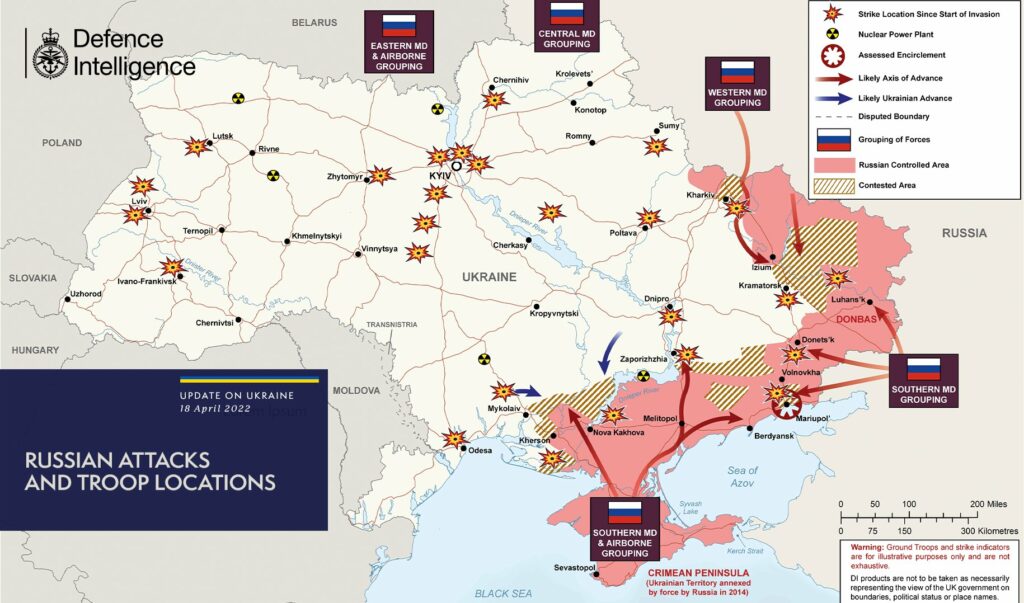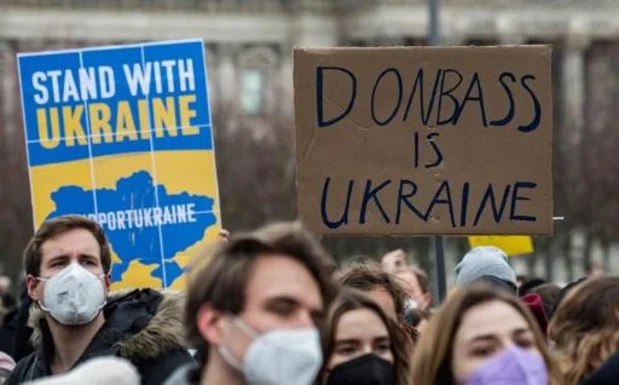The Kremlin is focusing its latest offensive on eastern Ukraine and will now reportedly move to seize the entirety of the Donbas. The region was at the centre of the conflict in 2014 when Russian-backed separatists launched a military offensive to form unrecognised breakaway states.
On Monday night, Russian forces unleashed large artillery and rocket attacks along Ukraine’s eastern front; Ukrainian officials claim this marks a new Russian offensive that stretches from Kharkiv in the north to Mariupol in the south.
Ukrainian President Volodomir Zelenskyy stated that Russia had been preparing for the battle for Donbas for some time, withdrawing forces from Kyiv to focus efforts in the east.
Yet on the 55th day of the war, Zelenskyy remains determined: "No matter how many Russian soldiers are driven there, we will fight."
US President Joe Biden has called for a videoconference on Ukraine later today with G7, EU and NATO leaders.
Russia's long-standing claims to the Donbas
A large part of the Donetsk and Luhansk regions in Donbas have been controlled by separatist groups who officially seek independence from Ukraine, but are in fact under the influence of the Kremlin.
With the legacy of Russian imperialism in the region, a large majority of the population in Donbas speaks Russian as a first language, rather than Ukrainian.
Donbas has been at the centre of Russia's plans to destroy Ukrainian's territorial integrity, often staking a claim to the region's large Russian-speaking population.
They have falsely accused Ukrainian authorities of suppressing Russian culture, going as far as claiming a genocide against pro-Russians – something which was disproved as false by the International Court of Justice (ICJ).
2014 invasion
In the aftermath of the Euromaidan protests in 2014, armed Russian-backed groups seized government buildings across Donetsk and Luhansk oblasts, together commonly called the Donbas, and launched a separatist insurgency in the region.
In April 2014, a survey conducted by Pew Research Centre found that 18% of eastern Ukrainians were in favour of secession, while 70% wished to remain part of a united Ukraine.
Regional referendums in May 2014 led to the declaration of independence for the two separatist entities, the so-called People's Republic of Donetsk and the People's Republic of Luhansk. The referendums were not recognised internationally and were widely seen as rigged.
A similarly disputed referendum in Crimea was used as a pretext for Russia's annexation of the Ukrainian peninsula in 2014.
Related News
- Putin has destroyed the last vestiges of the ‘Russian world’
- Protests against Russian fuel tankers in Port of Antwerp
- Kyiv urges the EU to provide more weapons and faster
Ukraine has often claimed that pro-Russian separatists in Donbas are funded and assisted by the Kremlin. Putin recognised the breakaway regions and signed cooperation agreements on 21 February 2022, using this as a pretext for invasion.
Economic and strategic importance
Russia's latest offensive aims to capture the eastern region, as troops have been withdrawn from the north of the country near Kyiv. Though military personnel have been pulled back, Russia continues with deadly bombardments in cities across Ukraine, including Lviv in the west.

Map of Russian invasion of Ukraine as of 18 April 2022. Credit: UK Ministry of Defence / Twitter
Russia now seems to be shifting its focus to annexing Ukrainian territory from Kharkiv in the north to Mariupol. If possible, it will try to completely cut off Ukraine's access to the Black Sea.
In the south of Donetsk lies the key port city of Mariupol, which has faced heavy bombardments for weeks. The city, which once had 450,000 inhabitants, was declared as conquered by Russia on Sunday after a six-week long siege. "Mariupol no longer exists," Ukrainian Foreign Minister Dmitri Kuleba said, "the situation there is heart-breaking."
The Donbas region is also crucial to Ukraine as it plays an important role in the country's economy. Donbas has one of the largest coal reserves in Ukraine and also provides gas, allowing the country to reduce its dependence on Russian gas imports.
Losing the entirety of these regions would be catastrophic for Ukraine, while also proving to be a victory for Russia, who may have had its eyes on securing the entirety of the Donbas all along.

